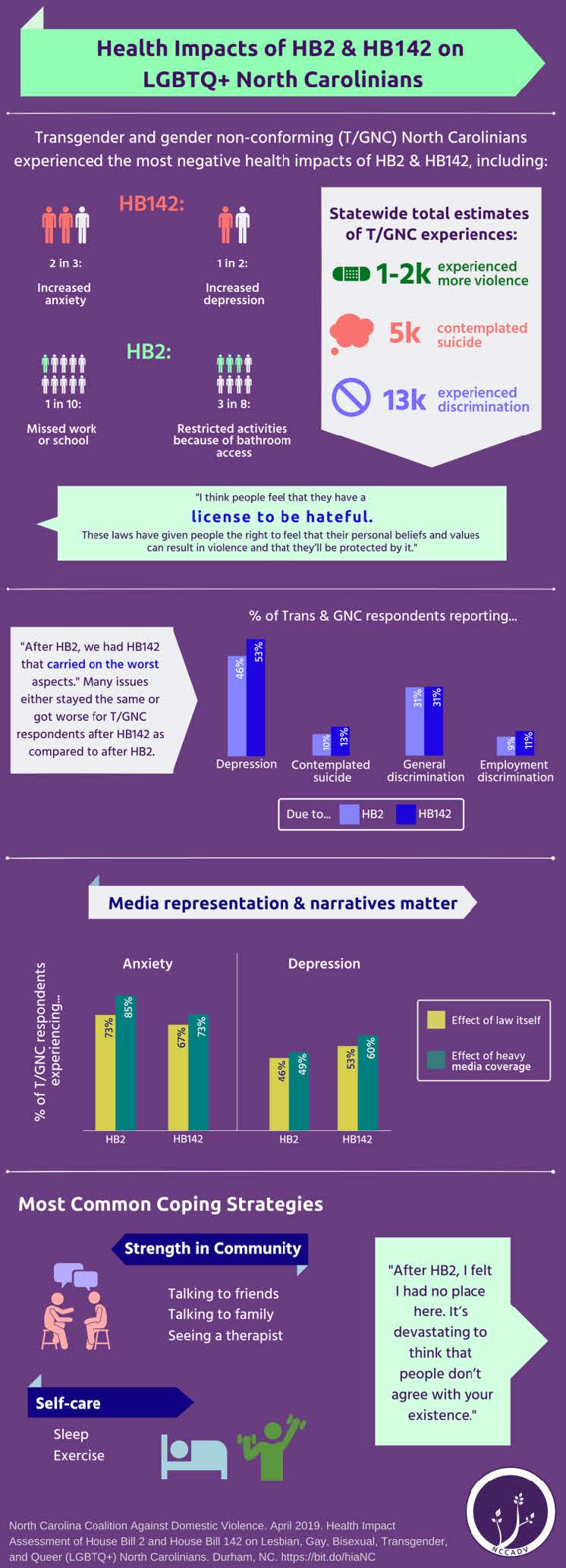Gillings School grad students report on health impact of HB2
July 30, 2019
A new report, co-authored by alumni and students of the UNC Gillings School of Global Public Health, outlines the physical and mental health impacts of North Carolina’s Public Facilities Privacy & Security Act — commonly known as HB2.
In March 2016, HB2, also known as “the bathroom bill,” became law in North Carolina. Among other things, the statute compelled public facilities with single-gender bathrooms to only allow people of the corresponding birth-certificate sex to use them. HB2 was met with widespread protests, as it raised safety concerns for transgender people who were prevented from using the restroom consistent with their gender.
While the statewide economic ramifications of HB2 have been well-documented, little attention was given to the ways HB2 and HB142 — the bill that eventually repealed and replaced it — affected the health and well-being of lesbian, gay, bisexual, transgender and queer (LGBTQ+) individuals and communities in North Carolina. Recently, the North Carolina Coalition Against Domestic Violence (NCCADV) released a report on the health and violence-related impacts of the two bills.
Five health behavior graduate students from Gillings School contributed to the report as part of their year-long capstone project. Working alongside health behavior alumni Raye Dooley and Deena Fulton — who are now the LGBTQ program advisor and the programs director, respectively, at NCCADV — the capstone team members researched key questions involving mental health and violence.
The team, comprised of students Kait Atkins, Meagan Robichaud, Jaclyn Shea, Varsha Subramanyam and Hannah Tuttle, reviewed relevant literature and available data sets, conducted focus groups with LGBTQ+ residents and service providers, and administered a statewide online survey to document the extent of LQBTQ+ experiences. Ultimately, they also created recommendations for health and wellness among LGBTQ+ North Carolinians moving forward.
The full report, titled, “Health Impact Assessment of House Bill 2 and House Bill 142 on LQBTQ+ North Carolinians,” was funded by the Centers for Disease Control and Prevention. One primary finding is that, during heavy media coverage of HB2, more transgender and gender non-conforming (T/GNC) North Carolinians struggled with mental health issues like anxiety and sadness, felt fearful in general and felt uncomfortable using public restrooms. The team estimated that, due to HB2 and HB142, 1,000-2,000 T/GNC across the state experienced violence, 5,000 contemplated suicide and 13,000 experienced discrimination. In addition, the state saw a 105% increase in murders among trans-identified North Carolinians from 2015 to 2016.
See the executive summary of the report for key takeaways expressed in infographic form.
Contact the Gillings School of Global Public Health communications team at sphcomm@listserv.unc.edu.

